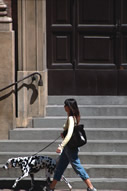
The pugnacious blind movie buff required the intervention of the police who confirmed that the manager of the movie theatre had asked to leave the dog outside. Reason: the presence of the animal in the room would have placed in significant danger the other spectators in case of an emergency.
We were quite curious to know what the law had to say about this. The law in such matters is n. 37 dated February 14, 1974, then modified by law n. 376 in 1988. Its sole article entails: (translation) "The blind person has the right to be accompanied by his own guide dog in his travels on any public
 transportation
without having to pay for the dog any ticket or taxes. Moreover, the blind
person has the right to access with his own guide dog services offered to the
public. Any other provision that could differ on this law is abrogated."
transportation
without having to pay for the dog any ticket or taxes. Moreover, the blind
person has the right to access with his own guide dog services offered to the
public. Any other provision that could differ on this law is abrogated."This rule seems clear and unquestionable, but for that very reason every citizen doubts that there could be another one which could be in contrast with it. In this case, in fact, it is worth to evaluate what interests must be defended: between those of the blind individual to be accompanied by his own guide dog and those of the community to be able to use the emergency exits without any mishap.
It is obvious that ensuring the safety of the public prevails over the single blind individual. That is in principle.
It is necessary, in fact, to consider as well the context in which we intercede, giving an interpretation instead of the other.

This context is about the protagonist, a single blind individual who has the right to access any service offered to the public (which is, in this instance, the movie theatre) with his own guide dog. The animal must therefore find an adequate place which will not cause any mishap nor disturb the public's enjoyment of the movie.
If these are the premises to respect, we still need to understand what could have been the manager's motivation for refusing access to the movie theatre to a would-be spectator with a visual impairment. How would it be possible, in fact, that a single dog could create an accident to other spectators is difficult to understand considering the presence of various exits and the possibility of placing the dog (even one of medium to large in size) in an adequate position to guarantee a margin of action.
The risk, truly concrete if the laws in effect are interpreted to the letter and in theoretical contradiction to one another is to state the following equation: You are blind? Then no movies. Also because if the blind person has the right to use specialized assistance from his own guide dog, guaranteeing at the same time his own safety (and therefore the safety of the others) since the dog would immediately be able to guide his master to the exit.
The question, therefore, is spontaneous: who will think of the blind person in case of the evacuation of a public room during an emergency, if Fido is waiting anxiously outside for his master?